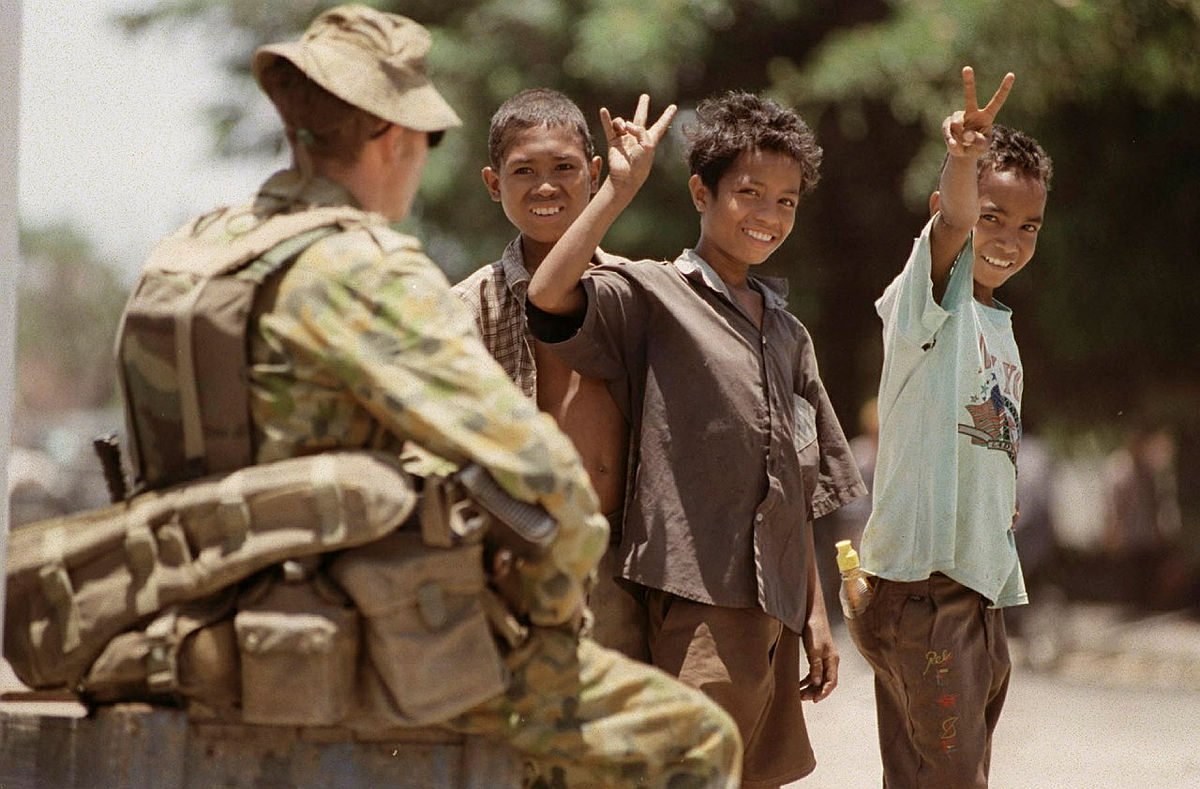
Australia gives security guarantees to two nations that have land borders with Indonesia—Papua New Guinea and Timor-Leste.
The word ‘guarantee’ rightly makes Oz politicians, diplomats and lawyers cautious, even nervous: never say forever, never say never, and try never to provoke Indonesia.
Perhaps ‘commitment’ is enough of a promise to PNG or Timor-Leste. ‘Guarantee’ has a cast-iron quality that could underwrite delinquency by Port Moresby or Dili. The guarantor faces the moral hazard of risks taken by those enjoying the guarantee.
Defence Department officials tend not to quibble over ‘commitment’ versus ‘guarantee’; they read what the strategic guidance says about Oz geography and interests and plan accordingly.
Australia’s
obsession or fixation with PNG dates back to the 1880s. But the de facto security promise to East Timor is new, born amid the extraordinary drama of the 1999
independence referendum.
As Timor wrenched free of Indonesia, Canberra was anxious and amazed at the
role it had to play—proud at how it all turned out, but mightily relieved it became a successful international mission and not war with Indonesia.
For the Howard government, the Timor
outcome was unbidden and unintended. When
John Howard wrote to Indonesia’s president in 1998 urging an ‘act of self-determination’, he emphasised that ‘Australia’s support for Indonesia’s sovereignty is unchanged’. Lots changed quickly after that.
The crisis wind in 1999 kept
blowing the Howard cabinet into new territory. By its actions, Australia made a commitment to what would become the new nation of Timor-Leste, and its sovereignty. Unintended consequences can be long-lasting as well as emphatic.
The
2000 cabinet records released on 1 January by the National Archives show Australia starting to grapple with its role in Timor’s future security. In August 2000, cabinet’s national security committee considered
post-independence scenarios for East Timor.
The submission by Foreign Minister Alexander Downer (prepared by the Department of Foreign Affairs and Trade in partnership with Defence) is an early sketch of what the paper calls a ‘bilateral security guarantee’.
Canberra was taking the measure of its enduring obligation to a ‘desperately poor’ Timor.
Cabinet agreed that Australia’s objectives for the post-independence period included ‘a secure and stable East Timor, the prompt withdrawal of Australian Defence Force (ADF) peacekeepers, and a security environment between East Timor and Indonesia ▬’. At this point, in the opening paragraph of the minute of cabinet’s decision, we hit the first of more than 20 black bars—phrases and paragraphs in the minute and submission that are blacked out because they’d ‘cause damage to the security, defence or international relations of the Commonwealth’.
Journalists are ever here to help, so let’s play the game of fill in this blacked-out bit: cabinet didn’t want Timor–Indonesia relations marred by confrontation, destabilisation and threat.
Such a reading draws on a paragraph on the other side of the next black bar, discussing engagement with Jakarta ‘to promote a benign security environment … in order to alleviate border tensions’, and the need for ‘active Indonesian efforts to reduce the militia threat’.
Cabinet agreed that Australia’s interests would be served by supporting the early establishment of an East Timorese security force. However, the submission said, some international security presence might be needed in East Timor after independence:
Australian participation, if any, in such a presence would be determined by factors such as cost, pressure on the bilateral relationship with Indonesia, our relations with East Timor, and domestic public expectations.
It would not be in Australia’s best interests for a post-independence presence to comprise ADF personnel without other international participation, ▬
Australia, the submission argued, should do everything possible to avoid a scenario in which it alone responded to future East Timorese appeals for security assistance: ‘Australian interests would not be served by an ADF presence in an independent East Timor in the absence of other international participation—and certainly not any ADF presence lacking appropriate UN cover.’
All that led to a final section of the submission headed ‘A bilateral security guarantee’. Only one paragraph long (including two black bars), it states:
Australia’s future bilateral security relationship with an East Timorese state will remain an over-arching issue. Our long-term interests in East Timor’s security and territorial integrity require careful consideration of how we can best promote these interests. In this respect, any scenario involving ongoing Australian participation in maintaining East Timor’s security beyond independence—even as part of a larger UN presence—raises the possible expectation of an ongoing bilateral security relationship (including the idea of a bilateral security guarantee) with East Timor. This is an issue which will ▬ require careful management and will need to be factored into any final consideration of options for dealing with East Timor’s future security needs. ▬
As so often in defence, discussion soon shifted from overarching rumination to issues of equipment. By December, the national security committee was pondering whether to
provide 300 M-16 rifles and ammunition to start the initial basic training of the East Timor Defence Force. Cabinet agreed to supply the 300 rifles and additional weapons in future if other donors couldn’t or wouldn’t.
The submission from Defence Minister John Moore said Australia supported the creation of an East Timor military which was ‘modest and affordable; lightly armed; and capable of engaging constructively with both Indonesia and Australia’.
DFAT’s comment on the submission said Canberra should keep the pressure on the UN to get the rifles from other nations. So much did the department want the UN to take responsibility it urged that Australia shouldn’t indicate any willingness ‘as this would diminish the incentive for the UN to seek weapons from elsewhere’.
In a comment hinting at the possibility of Timor engaging Indonesia in conflict rather than constructively, DFAT urged that Australia ‘not provide weapons that exceed the capacity’ of the Indonesian military.
And that’s the thing about Australia’s security guarantees to Timor-Leste and PNG: Indonesia is always there, on the other side of that land border. Both bilateral guarantees are balanced within triangular relationships.
 Print This Post
Print This Post